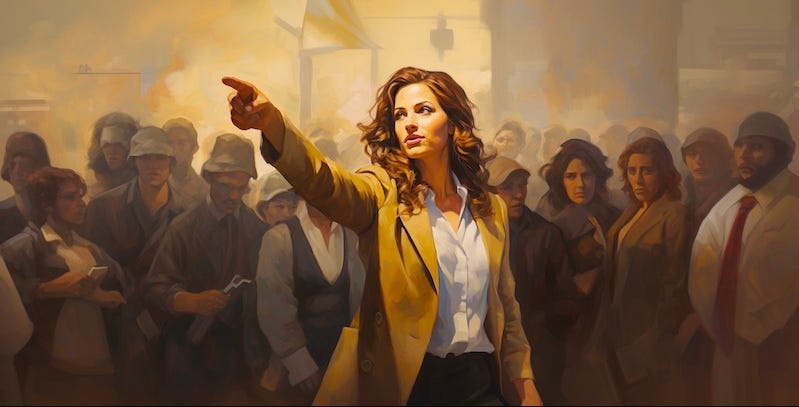244. Robert Frost Was Wrong: How Successful Leaders Make Decisions
Having choices makes us feel like we are in control. It makes us feel empowered. As leaders we often have too many choices. That's when the trouble begins.
Robert Frost was wrong.
If you don’t know who Robert Frost is, just turn to somebody - anybody - with an entrepreneurial spirit, and ask them to name their favorite poem. Odds are pretty darn high that they will refer to Mr. Frost’s iconic ditty, “The Road Not Taken.”
The lines of the poem are some of the most well-recognized poetry in the world, this side of “roses are red, violets are blue.”
Here are the final three lines of the poem:
Two roads diverged in a wood, and I -
I took the one less traveled by,
And that has made all the difference
That’s Robert Frost.
Most every entrepreneurial thinker under the age of 45 probably believes that the road less traveled symbolizes their courageous journey through life.
They believe the road less traveled is about risk-taking and their desire to live their lives differently.
Oh, silly silly people.
I hate to tell you, but it’s all a heaping hamper of hogwash.
Robert Frost missed the point.
And if he didn’t miss it, then you did.
When Information Becomes Overwhelming
Automatic notifications have become such an essential part of our lives. We live our lives by auto-notifications.
Back when I was a kid, we had to proactively look at the calendar to remember our meetings. Oh, the horror!
We had to watch the evening news or read the newspaper to find out what was happening in the world. And we had to look at an actual clock to figure out if it was time to go to wherever we had to go.
[Editor’s Note: For those who don’t understand, there were things called “clocks”, which were like notification-less Apple Watches, but bigger, and they hung on the wall instead of on your body. Unless your name was Flavor Flav. Long story - Google him.]
Today we get automatic notifications in real-time to remind us and inform us about stuff.
That’s good.
But we now get notifications on everything all the time.
That’s bad.
Periodic notifications for your appointments and text messages - good.
On-going notifications from 50 different apps about everything happening in the world no matter how irrelevant - bad.
It can quickly become overwhelming to get all of that information. The very thing that helps us (real-time information) can just as quickly hurt us.
The same problem occurs with choices.
It’s called the Paradox of Choice.
The Paradox of Choice in Making Decisions
We, as humans, like having choices. It’s one of the basic elements of life and leadership. By having choices, we feel like we are in control and empowered.
Every parent eventually comes to understand this.
“You have a choice, you can eat your vegetables or you can go to your room and starve while you contemplate your life decisions at the ripe old age of 5-years-old.”
Since choices make us feel like we are in control, and since being in control makes us happy, one would naturally believe that having more choices would make us more happy.
Right?
Wrong.
It’s actually the opposite.
That’s the paradox.
Having too many choices actually constricts us. Because choosing is hard - and learning to choose well is even harder.
The Hard Decisions
Let’s bring this back to Robert Frost for a minute.
“Two roads diverged in a yellow wood,” he famously wrote as the first line of his poem.
Throughout the rest of the stanzas, the author contemplates the path he should take - the well-traveled trail or the less traveled road.
However, the decision is somewhat irrelevant. It’s like the “broccoli or starve” choice. It’s binary. He only had two choices. Maybe one of them was a better decision or maybe neither one was better or worse than the other. It doesn’t matter.
That’s not a challenge in leadership - that was just a challenge for Robert, who clearly isn’t the best decision-maker in the world.
Throughout the entire poem, Robert Frost remains standing dumbfounded at the divergence of the two paths.
Honestly, if he’s having such a tough time deciding between two seemingly fine paths, he’s going to be really screwed once he keeps on walking. Because in order to understand the real challenges of leadership, you’ve got to quickly make a decision and then travel further down that trail, away from where Mr. Frost stood frozen in wonder.
There will be so many twists and turns and ups and downs you won’t remember which way is where and why you are there. But that’s still the easy part.
Soon enough, you will arrive at another intersection in life. But this one isn’t about two simple paths diverging in a wood. Nope, those were the simple choices.
Now you begin to encounter 5 roads intersecting. Or 7. Or 9. Or however many challenging choices you have to tackle as a leader.
THAT is what the poem should be about.
Five paths converged in a wood, and I -
I had no friggin clue which one I should take,
But I had to make a quick decision because people’s livelihoods depended on me somehow making the right choice.
The Decisions of Successful Leaders
You may have heard me in the past say that you can tell a lot about a company by how they make decisions. I say it a lot, mostly because it’s true. And because many leaders I work with in my consulting and coaching practices don’t think about their decision-making and how to improve it.
This leads us back to the paradox of choice.
Successful leaders are the ones who don’t get stymied when presented with multiple options, none of which seem clearly the “correct” choice.
When there are too many choices and not enough information for each choice, how do you decide?
To address the elephant in the room, Robert Frost decided incorrectly.
I don’t mean he made the wrong decision - I could care less what road he chose to travel on during his nice little hike. What I mean is that the method he used to decide was pretty poor.
He stopped at the point where the paths diverged and he looked at them. He assessed one path’s appearance as compared with another. Then he decided based on how those paths appeared.
However, the decision of which way to go has very little to do with the path you see in front of you.
This is where many leaders run into problems with their decision-making. Like Robert Frost, they are shortsighted.
How to Choose from All Your Choices
When it comes to decision-making, it’s not about the choices in front of you, it’s about the end goal further down the road.
When leaders are presented with multiple options, making an informed and effective decision involves several steps and begins far before you even get to the intersections.
Here’s how you do it.
Before you even encounter options, you should already have completed this important stuff:
1. Understand your foundation
What are your values? Your mission? Your vision?
2. Be crystal clear on your goal
What is the problem you are trying to solve?
3. Prioritize the info
What are the most important elements towards reaching your goal? Of those, which are the most important and which are the least?
If you aren’t clear on all those things above, let me know. I spend my days as a strategic consultant helping leaders build their foundations and set a roadmap to get them from here to there.
Now that you have your foundation, decision-making at any crossroads should be much easier.
4. How does each choice align?
Determine how each option aligns with your foundation (#1 above), your goals (#2 above), and the most important elements for your growth (#3 above). Get rid of every option but the one or two that most align.
5. Trust your gut
Sometimes gut feelings really help, I can’t lie about that.
6. Make a choice and commit
Robert Frost stood around for a long time contemplating a less-than-challenging decision. That’s poor leadership. Don’t be like Robert Frost. Analyze and act. Make the decision and move forward.
7. Be transparent
Let your people know why and how you made the decision. Teach them what you did so they can do it better themselves in the future.
Sometimes you’ll make the right decision, sometimes you won’t.
Sometimes it will be good for the long term, sometimes it won’t.
However, as long as you are clear on where you want to get to, I have no doubts you can be a better decision-maker than Robert Frost.
Now go choose some paths to travel.
Go on. Git.
Somewhat Relevant Quote
“When your values are clear to you, making decisions becomes easier.”
Roy E. Disney - super rich dude, nephew to Walt, firer of Michael Eisner
Random News
Dead End - When the fortune teller is both right and wrong
Oh Shit - A woman that makes jewelry you don’t want to wear
House of Cards - Then it all came crumbling down
Killer Coffee - The cup alone will kill you








It's a great poem and a powerful reminder about the choices we make. Love how you laid out how to be prepared for the myriad choices our complex world will present us, Jeff.
I took yet another view of Frost's poem a while back - a hint that Frost dropped but that everyone seems to miss when reading it: https://www.timelesstimely.com/p/the-road-not-taken
The lines “I took the other, as just as fair,” and “the passing there / Had worn them really about the same” indicate that there was no difference between the two.
And yet, he tells us that when he tells this story to others (“I shall be telling this with a sigh / Somewhere ages and ages hence”) he’ll tell everyone:
“Two roads diverged in a wood, and I—
I took the one less traveled by,
And that has made all the difference.”
So Frost's poem isn’t really about making uninformed choices; it’s about how we develop narratives to justify our choices after the fact.
A much different interpretation than we usually get.
Great read as usual Jeff, but no more picking on my favorite poet and second favorite poem! 🤣